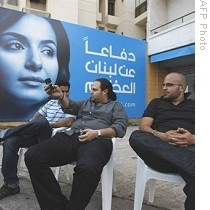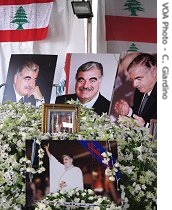Beirut
05 June 2009
 |
| Supporters of Nayla Tueni (posters) sit in front of electoral office in Beirut's Christian Achrafiyeh district, 27 May 2009 |
Nayla Tueni is candidate for parliament. A stable Lebanon matters to her more than most. Her father was MP, Gebran Tueni. He was assassinated in 2005. His murder was widely seen as revenge for his outspoken criticism of Syria's political control over Lebanon. Nayla Tueni believes outside forces are still a major threat to Lebanon.
"We don't know if they will continue to kill us, continue to kill those who are not with the Syrian regime, who are not with the Iranians, who are not with Hezbollah and who are not with all these people because we are asking for our freedom, sovereignty and independence, maybe they will kill us, nobody knows," she said.
Boutros Harb, a Lebanese member of parliament up for re-election, also believes that improving security in Lebanon is key to improving life in the country.
"Building a country, a stable country without everyday war and transforming Lebanon away from continuous struggle will help Lebanon to have a better economy, a more stable economy and will help people have a better standard of life," he said.
The desire for safety and political stability for the elections is reflected in the streets of Beirut.
This man says as long as there is safety and security everything even the economy will improve.
This woman says security is the most important, but the Lebanese forces will be out for the elections so I'm not afraid.
 |
| Flowers adorn the gravesite of Rafik Hariri in downtown Beirut (file photo) |
"For him and for my country, because I love my country, I decided to present myself for the election. I believed in what he said and what he wanted for the country," she said.
The desire for stability in Lebanon seems one that everyone wants - the challenge for politicians will be making that dream of security into a reality.